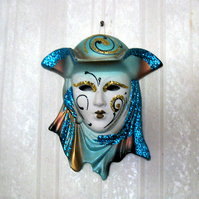 Do you ever suffer from what’s referred to as the “imposter syndrome?” That happens when we don’t feel good enough to be doing something. You might have a very high powered job but insecurity makes you think, “What am I doing in this job? What if people find out that I’m not good/smart enough to be here.” Many things can cause the imposter syndrome. It can be found in work situations, in a circle of friends or a parents group where you feel your income or work status isn’t as good as the other people’s, or in many other situations.
Do you ever suffer from what’s referred to as the “imposter syndrome?” That happens when we don’t feel good enough to be doing something. You might have a very high powered job but insecurity makes you think, “What am I doing in this job? What if people find out that I’m not good/smart enough to be here.” Many things can cause the imposter syndrome. It can be found in work situations, in a circle of friends or a parents group where you feel your income or work status isn’t as good as the other people’s, or in many other situations.
It tends to happen to people who don’t value themselves or their skills enough and who focus on their shortcomings instead of their good qualities.
Years ago I had a client (I’ll call him Henry) who was a very powerful man in his field. Several years earlier he’d begun his own business and it did very well. He was written up in magazines, often asked to speak at conferences and highly respected by his peers. Yet Henry felt like an imposter, simply because the college he attended wasn’t one of the top ones for his field. He was accepted into several top schools but his mom was ill so he went to one close to home.
It always niggled at Henry that he went to a school that didn’t have a top reputation. He explained to me over and over that in his industry, where you got your education mattered. Here he was, at the top of his field, making millions and he felt like an imposter–that he shouldn’t be as successful as he was, simply because he didn’t come from a top rated college. It caused him great shame. He was terrified someone would find discover his secret and let the industry know he was somewhat of an imposter, rubbing elbows with all the top school graduates.
When you let what you don’t have define you, it can make you feel like an imposter.
I used to feel like an imposter. “How can I write when there are other writers who are better than me?” “I don’t know everything so how can I teach? People will eventually figure out I’m not perfect.” I was being pushed to write my first music biz book since I was already teaching workshops but I argued that if I did, people would see me as an imposter. I told that to a friend who asked me why. I explained I didn’t know everything about the music industry. He laughed and dared me to find someone who did.
Often our high standards for being perfect make us feel like imposters if we fall short of perfection.
My friend insisted that while there might be things I didn’t know well, the people who knew those things well didn’t know everything I knew well. I realized he was right. And, he went on, I could get any info I needed from the experts. He was right again! This motivated to interview lots of experts for my books so I could make sure I had my bases covered. By doing that I learned what I didn’t know and made my books much stronger by having input from many experts. The imposter syndrome left me. Now I own who I am and what I do.
It’s amazing how many people in high-powered corporate positions tell me they wonder how they’ve managed to stay in their jobs so long without people discovering they’re really not as smart or capable as they probably should be. I actually first heard he term, imposter syndrome, from the managing editor of a top international magazine. I interviewed her about her job and when we chatted after, she told me, off the record, that she was glad nobody had yet figured out that she didn’t belong in that position. It was her dream job and she did it well but her low self-image made her feel like an imposter who’d get caught one day.
It’s all insecurity! And unnecessary. And common. And natural for us to feel this way.
It’s a choice to feel inadequate if you’re not perfect. Otherwise, since nobody is perfect, everyone would be an imposter. The key is to change your perception. When you accept that perfection isn’t possible to achieve and that you’re doing a job that others find good, you can begin to cut yourself the slack needed to see the good you do, instead of judging yourself more by your faults. Be your own cheerleader instead of trashing your self-image. List all the reasons for why you got the job–your qualifications and achievements–or why you’re hanging with the people you feel you’re not as good as.
Once I recognized I didn’t have to know everything to be an expert or write a book, I slowly owned my accomplishments. As I told the editor, if she didn’t belong in her job, she wouldn’t be there. When you’ve felt insecure your whole life, it can be hard to believe where you end up. But you got to where you are because you earned it. I remember the first few times I attended functions for a prestigious women’s group. Most people were corporate. I felt a bit out of place at first. When I began to actually fit in I felt like an imposter, since they wear suits to work and I often work in my pajamas. But I reviewed my accomplishments and knew I had nothing to feel funny about. Now I fit in comfortably!
If you start to feel like an imposter at your job or in a circle of people or in any other situation, remind yourself who you are today.
Let go of memories of times people put you down or you were a DoorMat and felt little worth. Own your skills, talents, good personality, knowledge and anything else that got you to where you are. You ARE as good as everybody else and belong wherever you are as long as you choose to believe it.
Take the 31 Days of Self-Love challenge and get my book, How Do I Love Me? Let Me Count the Ways for free at http://howdoiloveme.com. And you can post your loving acts HERE to reinforce your intention to love yourself. Read my 31 Days of Self-Love Posts HERE.
Please leave comments under my posts so we can stay connected.

